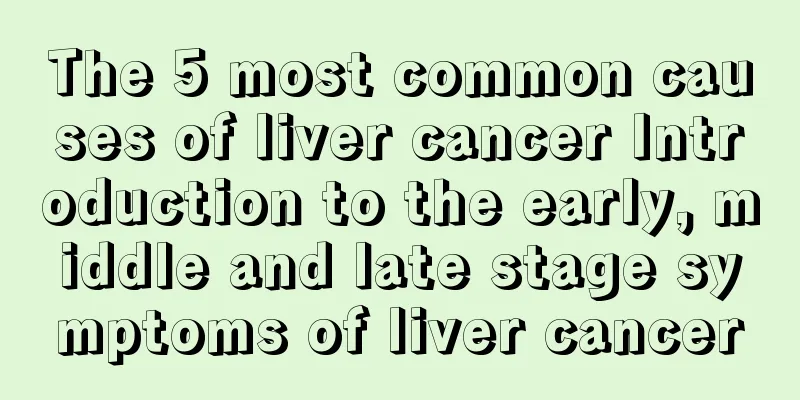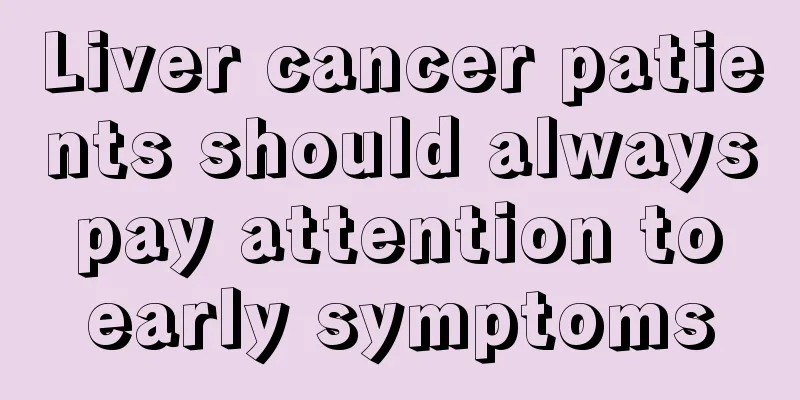The 5 most common causes of liver cancer Introduction to the early, middle and late stage symptoms of liver cancer

|
Liver cancer is a type of cancer in the liver, which is very harmful to our health. Do you know what are the causes of liver cancer? The main causes of liver cancer in my country include viral hepatitis infection, aflatoxin contamination in food, and drinking water pollution in rural areas. Causes of Liver Cancer 1. About 1/3 of liver cancer patients have a history of chronic hepatitis, and the positive rate of Australia antibody (HbsAg) is significantly higher than that in low-incidence areas. It has been found that hepatitis C virus infection, like hepatitis B infection, is closely related to the incidence of liver cancer. Hepatitis B virus and hepatitis C virus are definitely one of the cancer-promoting factors. 2. About 50% to 90% of liver cancer patients have concurrent cirrhosis. In recent years, it has been found that the proportion of hepatitis C developing into cirrhosis is no less than that of hepatitis B. 3. Experiments have shown that aflatoxin B1, a metabolite of aflatoxin, has a strong carcinogenic effect and exists in moldy corn, peanuts and other foods. In areas where food is seriously contaminated by aflatoxin B1, the incidence of liver cancer is also high. Nitrosamines, azo mustards, alcohol, organochlorine pesticides, etc. are all suspected carcinogens. 4. Some drinking water is often polluted by polychlorinated biphenyls, chloroform, etc. In recent years, it has been found that blue-green algae growing in ponds are strong carcinogenic plants that can pollute water sources. Parasitic diseases such as Clonorchis sinensis infection can stimulate bile duct epithelial hyperplasia and lead to primary bile duct cancer. 5. Long-term alcohol abuse is the number one killer of liver damage. This is because after alcohol enters the human body, it is mainly decomposed and metabolized in the liver. The toxicity of alcohol to liver cells causes liver cells to have obstacles in the decomposition and metabolism of fatty acids, causing fat deposition in the liver and resulting in fatty liver. Early symptoms It takes about 2 years for liver cancer to develop from the first cancer cell in the liver to the patient's subjective symptoms. During this period, the patient may not have any symptoms or signs. Only a few patients may experience anorexia, upper abdominal distension, abdominal pain, fatigue, loss of appetite, etc. Some patients may experience mild liver enlargement, jaundice and skin itching. However, in general, these symptoms are difficult to be taken seriously. Therefore, in clinical practice, many liver cancer patients are often in the middle or late stage of their disease when they are discovered. Symptoms in the middle and late stages 1. Pain in the liver area. The most common type is intermittent or persistent dull pain or bloating. The rapid growth of the tumor will tighten the liver capsule and invade the diaphragm, causing pain. This pain can radiate to the right shoulder or right back. A tumor growing to the right back can cause right waist pain. Sudden onset of severe abdominal pain and peritoneal irritation signs indicates subcapsular bleeding of the cancerous nodule or rupture into the abdominal cavity. 2. Gastrointestinal symptoms, such as loss of appetite, indigestion, nausea, vomiting and diarrhea, are easily overlooked due to their lack of specificity. 3. Fatigue, weight loss, general weakness, and a few patients in the late stage may develop cachexia. 4. Fever, generally low-grade, occasionally reaching above 39°C, presenting as persistent fever, low-grade fever in the afternoon, or high fever of the remittent type. Fever is related to the absorption of necrotic products of the tumor. Compression or invasion of the bile duct by the tumor may lead to biliary infection. |
Recommend
What's wrong with headache and fever
Headaches are very common around us, and headache...
How to whiten skin that is tanned by the sun?
The skin will easily become darker when exposed t...
How to treat premature ejaculation caused by masturbation?
Moderate masturbation will not cause any harm to ...
Is the cure rate of advanced brain cancer high?
The more common treatments for tumors include sur...
What to put in the bath to detoxify and lose weight
There are actually many things to pay attention t...
What should I do if the echo of bilateral thyroid gland is uneven
Some people find that the size of their bilateral...
Which hospital is good for uterine cancer
Which hospital is the best for treating endometri...
What should I do if my finger joints are stiff and painful in the morning?
Sometimes we often find that our finger joints fe...
The correct way to apply lotion
Whether the effect of women's makeup is good ...
What is the reason for the pain in the soles of my feet when I walk?
Many friends occasionally find themselves feeling...
How long can you live with kidney tumor and kidney cancer
Kidney cancer is a very harmful disease. It bring...
Having sex after giving birth is very painful
After a woman gives birth, her body will be much ...
Does viral fever require intravenous infusion?
Whether viral fever requires intravenous infusion...
Introducing the symptoms of early melanoma
The symptoms of early melanoma are manifested on ...
What is the effect of diammonium glycyrrhizinate injection
The main function of diammonium glycyrrhizinate i...









